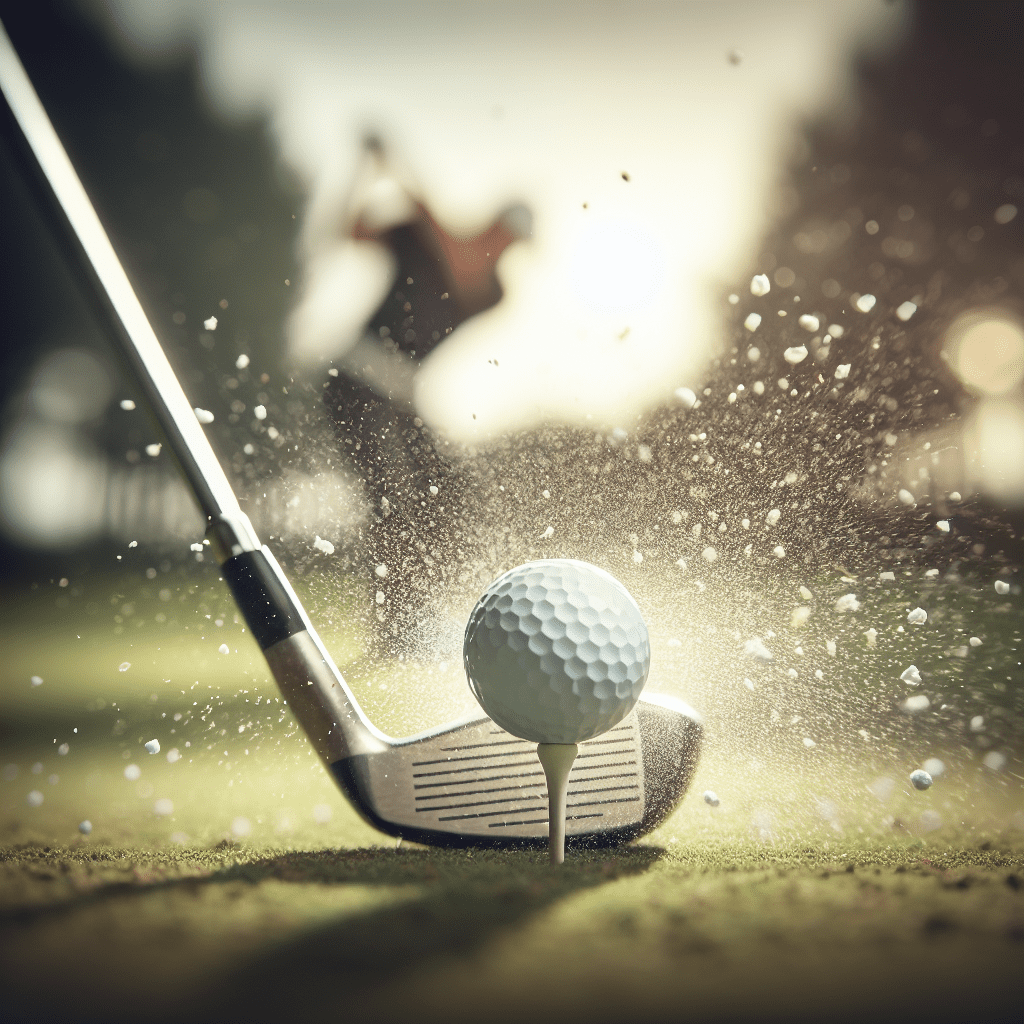Just starting out in the expansive world of golf? On the lookout for some smart strategies to take your game up a notch? Hold tight, fellas! It's now time to dive deep into the fascinating sphere of golf balls and unleash the secret behind utilizing them effectively for an awe-inspiring golf game, just like using the right keys to unlock a tightly secured vault of success! The golf ball, albeit petite, plays a mammoth role in defining your game's potency – it's a significant game changer, folks! If dialing up your distance or precision is your goal, obsessing over the perfect golf ball can be the key to unlock a riveting experience out on the green. Let's tee off to unravel the enchanting universe of golf balls and arm you with critical insights for your upcoming games.
The Incredible Impacts of Golf Ball Selection on Your Game
Choosing the right golf ball is no mere whim for mastering the majestic game of golf. It's an absolute non-negotiable if you aim to turn the table in favor of your gaming prowess. The choice of golf ball can be a real game changer, and unfortunately, not many golfers give it the importance it deserves. This article, hence, aims to demystify the art of golf ball selection and provide you the much-needed intelligence for elevating your game.
1. Cracking the Code: Understanding the Impact of Selecting the Right Golf Ball
1.1 Hiking Performance and Consistency
Selecting the right golf ball can be instrumental in boosting your performance and consistency on the course. Preposterous as it may sound, certain golf balls offer different levels of compression, which could influence how the ball behaves and feels upon contact. Hence, by choosing a golf ball with a suitable compression that aligns with your swing speed and skill set, you could significantly improve the overall feel and control of your shots.
1.2 Multiplying Distance and Accuracy
The right golf ball could just be the magic potion for inflating your distance and accuracy. Understanding that golf balls are engineered with varying levels of spin and aerodynamics, which can significantly impact the journey of the ball and its capacity to retain its trajectory during flight, is crucial. Thus, aligning the golf ball with your swing speed and playing style could maximize your distance off the tee and elevate the chances of accurate shots.
1.3 The Need for Spin and Control
Mastering the spin and control can be your ticket to golfing glory, especially when it comes to approach shots and putting. By selecting a ball that compliments your shot-shaping abilities and fits your desired feel on the greens, you can dramatically inflate your scores.
1.4 The Safety Quotient: Minimizing Injury Risks
A careful choice of the golf ball can be a pragmatic strategy to reduce the potential risks of injury. Golf balls with a higher compression level can lessen the tension on your joints and wrists, thereby cutting down the propensity for developing irksome injuries. Henceforth, selecting a golf ball aligning to your swing speed and expertise could be a smart move to secure your physical health and ensure long-term participation in the game.
2. Considering Critical Factors for Choosing a Golf Ball
To ensure that the chosen golf ball is in sync with your gaming style, it's essential to consider a slew of factors. Such factors may range from compression to construction, type of cover material, dimples, and the swing speed/skill level. So let's decode each aspect in detail.
2.1 Compression and Construction
Compression, which denotes the rigidity of a golf ball's core, impacts how much the ball deforms when you hit it. Low compression balls – the softer lot, would ideally be beneficial for players with slower swing speeds, offering them a boost in distance. On the other extreme, higher compression balls are compatible with faster swing speeds with an edge in control. Construction, referring to the different layers within the golf ball, can critically impact the golf ball's performance. Golf balls with multiple layers furnish different properties in the core, mantle, and cover, offering improved distance and control.
2.2 Decoding the Cover Material
The cover material of a golf ball primarily dictates its performance. Golf balls typically feature two types of covers – urethane or ionomer. While the former provides superior spin and control, making them a top choice amongst skilled golfers, the latter caters to durability and distance, making them an apt choice for beginners and those with slower swing speeds.
2.3 Demystifying the Role of Dimples
The dimples on a golf ball play a crucial part in its aerodynamics. However, it's essential to note that dimples alone can't guarantee superior performance and should be weighed alongside other crucial factors when choosing the right golf ball.
2.4 The Swing Speed and Skill Level
Your swing speed and prowess in the game are essential determinants when selecting a golf ball. So the thumb rule should be – slower swing speeds necessitate lower compression balls for optimum results, while faster swing speeds should opt for higher compression balls to ensure better control and feel.
3. Tailoring the Golf Ball Selection to Your Game
Mastering the art of aligning the golf ball selection properly with your gaming style is quintessential. Let's delve into the recommended ball types for different handicap ranges.
3.1 High-Handicap and Beginners
High-handicap and beginner golfers are suggested to focus on forgiveness and distance when selecting a golf ball. Opting for a lower compression ball with a sturdy cover material could compensate for errors and provide an optimum balance of distance and control. Therefore, golf balls specially crafted for higher-handicap players that provide forgiveness and promote a straighter ball flight would be a wise choice.
3.2 Mid-Handicap and Amateur Players
Mid-handicap and amateur players are spoilt for choice with a wider range of golf balls. These players can opt for balls with moderately higher compression, coupled with golf balls that have a urethane cover, offering a reasonable balance between control, distance, and spin.
3.3 Low-Handicap and Professional Golfers
Low-handicap and professional players, on the other hand, should look for golf balls that offer the highest control. These players should consider golf balls with higher compression that, along with a urethane cover, offer enhanced spin and control. Moreover, the design should allow for workability in shaping shots. These advanced players prioritize feel and control to execute more precise shots.
4. The Significance of Personal Preference and Testing
While it's crucial to consider the factors mentioned above while choosing a golf ball, personal preference and rigorous testing also hold the key.
4.1 Trials and Experiments: Testing Multiple Golf Balls
To conquer the game of golf ball selection, it's imperative to experiment with diverse brands or models. By giving various golf balls a whirl, you can assess the individual performance and get a hang of each one, thus enabling an informed choice.
4.2 Evaluating Your Performance and Feel
While testing different golf balls, it's crucial to focus on your performance complimented with how the ball feels. Pay close attention to the range of your shots, their accuracy, and how they react on the greens. The crux is to find a golf ball that not just enhances your overall performance but also feels comfortable with your style of play.
4.3 Keeping an Eye on the Conditions and Course
Also, factoring in the conditions of the course you frequently play, along with the golf ball's performance un
5. Busting the Common Myths around Golf Balls
A host of misconceptions color the air when it comes to golf balls, which can significantly influence your selection process. Let's debunk some of these myths.
5.1 Myth: Expensive Golf Balls are Superior
Discrediting the common wisdom, expensive golf balls aren't always the best choice for every golf player. A higher price tag invariably translates to more advanced tech and performance for low-handicap players; however, they might not be necessary or suitable for everyone. It's vital to align your golf ball to your playstyle and skill, rather than investing in an expensive price tag.
5.2 Myth: The ‘One Golf Ball Fits All' Theory
Each golf game and player is unique, so the notion of ‘one golf ball fits all situations' holds no water. And, as intuition may suggest, sticking to one type of golf ball for different scenarios can curb your performance and prevent you from exploiting your true potential on the course. Tailoring your golf ball to your game by considering your swing speed, competence, and playing style is an indispensable necessity.
5.3 Myth: The Brand Tag
A brand name often carries a halo of prestige and authenticity, especially in the golf world. But obsessing over the brand name while choosing a golf ball could land you on thin ice. It's always a good idea to experiment with a wide range of brands to fetch the best golf ball that caters to you, irrespective of the moniker it carries.
5.4 Myth: New vs. Used Golf Balls
There's a perennial myth that brand new golf balls are superior to used ones. Though new golf balls offer consistent performance and inherent characteristics, used balls can still deliver reasonable performance and prove to be a low-budget alternative for several players. As long as the used ball is in good, playable condition sans serious damage, it can still fetch satisfactory results.
6. Signing Off
Choosing the right golf ball is an art that can drastically elevate your performance on the golf course. Understanding the dynamics of golf ball selection and considering critical attributes including compression, construction, cover material, and dimples, and aligning the golf ball to your game can unlock unexplored avenues of distance, accuracy, and control for your game. Remember to never cease experimenting, giving different options their fair chance, and selecting the one that offers the best feel and results. Remember, shattering common myths about golf balls can help you make an informed and precise choice. So, embark on this exciting journey of discovering the right golf ball and watch your game take a quantum leap! Happy golfing!
TL;DR Key Points
- Understanding the significant role of golf ball selection in enhancing game performance is crucial.
- Factors such as compression and construction, cover material, dimples and swing speed/skill level play a key role in choosing the right golf ball.
- It's beneficial to match the golf ball selection to your game, while considering your personal preference, performance, and regular playing conditions.
- Busting common myths about golf balls can aid in accurate decision-making.
- Taking the time to choose the right golf ball can significantly improve your golfing experience.






